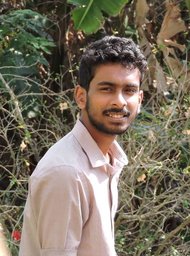Tathagata Basu
 I am born and brought up in India, Asia. I completed my Masters’ degree in Mathematics from the Indian Institute of Technology, Bhubaneswar and then spent one and a half months at the Indian Institute of Technology, Guwahati as a Junior Research Fellow within the Department of Mathematics.
I am born and brought up in India, Asia. I completed my Masters’ degree in Mathematics from the Indian Institute of Technology, Bhubaneswar and then spent one and a half months at the Indian Institute of Technology, Guwahati as a Junior Research Fellow within the Department of Mathematics.
The course structure of my masters’ degree emphasized greatly the scientific computing and optimization techniques. Therefore it allowed me to learn several numerical methods for solving differential equations, as well as fuzzy optimization techniques including genetic algorithms, the pso algorithm, portfolio optimization etc.
Earlier, during my undergraduate studies, I had statistics as my minor subject and it intrigued me a lot. I continued to pursue my interest in this subject and gained some further knowledge on inference theory and regression analysis, which are one of the most important tools to deal with large scale data with uncertainty. The concept and vast real-life application of imprecise probability attracted me the most.
Till now, my research focused on large scale data handling with the help of tensor train decomposition. I have worked on the problems of stochastic modeling, and data analysis within a Bayesian framework. I mostly worked on numerical schemes for random processes such as Monte-Carlo method and stochastic-Galerkin method. During my master dissertation I looked forward to the stochastic collocation method that solely depends on the backbones of MC method and SG method. It helps to form the system with uncertain parameter as a d-dimensional tensor which eventually leads to tensor train decomposition to get rid of the ‘curse of dimensionality’.
Besides the aforementioned topics, I also had the opportunity to learn some basics of aero-dynamics. I spent two months at Tata Institute of Fundamental Research, Center for Applicable Mathematics. Here I worked on the theory of optimal control which lead to the lunar soft landing problem. During this phase I gained some valuable knwoledge on the mathematics behind the space-crafts under the guidance Prof. Mythily Ramaswamy.
Right now I am working on the UTOPIAE ESR9 position under the supervision of Dr. Einbeck and Dr. Troffaes. My task is to develop a methodology, based on imprecise probability, to obtain statistical inference for highly dimensional data with limited structural knowledge. The problem is tackled from a unified Bayesian-frequentist viewpoint with the help of sparse model representation through appropriate priors or penalties. The existing LASSO estimators will be taken as starting point for this research.
Objectives: To investigate algorithms and methods for uncertainty quantification using statistical models for highly dimensional data with limited structural knowledge, in a way that leads to computationally efficient yet still reliable inference about the actual risks in the system; To investigate how standard statistical simulation approaches, such as for instance Markov chain Monte Carlo, can be extended to modelling scenarios involving imprecise priors or penalties; To derive theoretical results from small scale tests; To upscale the dimensionality of the application, depending on the results of the small scale tests.
Expected Results: Enabling methods of a non-parametric character to be applied to much larger problems than is currently possible. An efficient computational framework to deal with highly dimensional data with limited structural knowledge. New efficient statistical simulation techniques. Improved representation of model uncertainty in simulation models, leading to better risk-informed decisions.
Planned Secondments: NPL (M19-21) to work on the treatment of experimental data and model validation within WP2.3, VKI (M28-30) to work on high-dimensional uncertainty propagation and the treatment of experimental data within WP2.2 and 2.3.